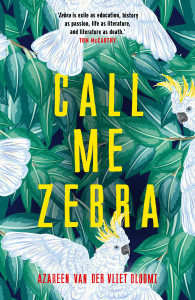


And by scale, I mean who the book is addressed to it’s emotional tenor, the quality of the joys and sorrows Zebra is navigating, and the insight she is reaching for when it comes to dissent, exile, love, and literature. So, it wasn’t until I could see all of the characters in the novel that I could see the scale of the book. I spent more than half that time reading intensely, traveling to the places Zebra inhabits in the novel, walking the same literary pilgrimages she goes on in the second half of the book with the Pilgrims of the Void.

The first sentence came rather late in the process, especially since Call Me Zebra was seven years in the making. Where did it come in your writing process, and did it change over time? The first sentence of this book just blew me away. I recently spoke with her about first sentences, exiles, and writing in the Midwest. She’ll be in Chicago this weekend for Printers Row Lit Fest, including an event on Sunday morning with Lillian Li and Nneka McGuire. Program in Creative Writing at the University of Notre Dame. Sit with that one for a minute! The story that follows is a bibliophile’s dream, tracking Zebra’s literary pilgrimage across the Mediterranean in a Quixotic search.Īzareen currently lives in South Bend, Indiana, where she’s an Assistant Professor in the M.F.A. Illiterates, Abecedarians, Elitists, Rodents all-I will tell you this: I, Zebra, born Bibi Abbas Abbas Hosseini on a scorching August day in 1982, am a descendent of a long line of self-taught men who repeatedly abandoned their capital, Tehran, where blood has been washed with blood for a hundred years, to take refuge in Nowshahr, in the languid, damp regions of Mazandaran. But Azareen Van der Vliet Oloomi‘s second novel, Call Me Zebra, gives Márquez a run for his money. The opening sentence of Gabriel García Márquez’s One Hundred Years of Solitude might be my favorite first line of all time.


 0 kommentar(er)
0 kommentar(er)
